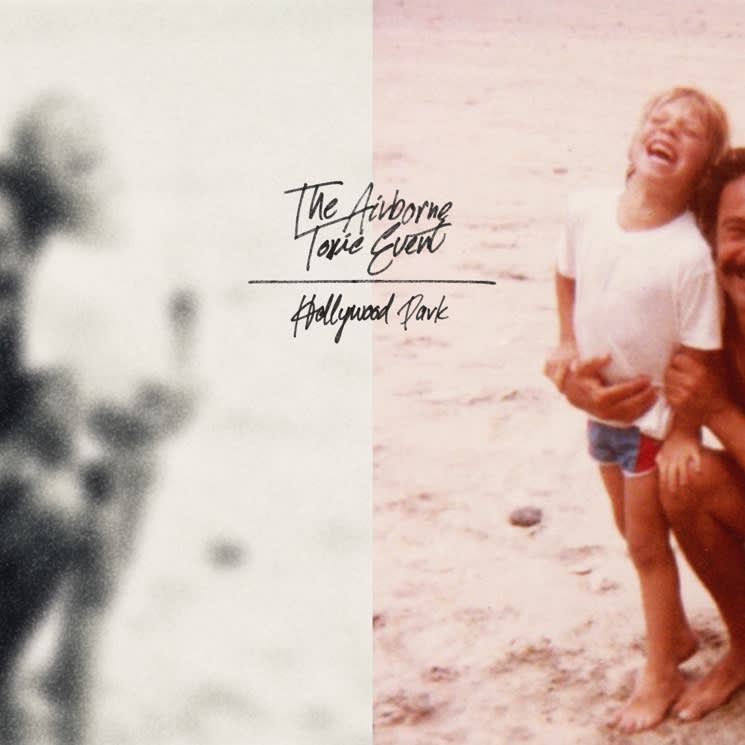At the heart of it, Mikel Jollett is a storyteller. As a published author and editor, Jollett understands how crafting a narrative is crucial to shaping our perception of reality and the world around us. And as a musician, lyricist, and frontman for L.A. indie-rock collective the Airborne Toxic Event (or TATE to their supremely dedicated fanbase), Jollett has turned this appreciation for avant-garde storytelling into a lucrative career. Coinciding with the release of Jollett's memoir of the same name, it's no surprise, then, that Hollywood Park — the group's sixth full-length album, and first in five years — deals in dense literary themes. Much like the ominous, poisonous cloud of existential dread that provides the group's namesake (lifted directly from Don DeLillo's 1985 postmodern novel White Noise), Hollywood Park finds the Californian quartet ruminating on memory and death, as Jollett attempts to unravel the spatio-temporal demands of recollection and reflection.
This need to revisit past lives with an almost cinematic scope is revealed on the album opener and title track. The sprawling, six-and-half minute epic takes its name from a now-defunct horse racing track in Inglewood, CA, a place where Jollett's late father would take the frontman and his siblings for male bonding and life lessons. In this way, "Hollywood Park" acts as an overture for much of the album, catalyzing the central motif of running, both physically and metaphorically, as realized in the act of flight and a child's desire for escapism. Channelling the working-class gusto of Bruce Springsteen and backed by galloping rhythms from Adrian Rodriguez (bass) and Daren Taylor (drums), Jollett speaks to his father's spectre and retraces a lifetime of struggle and trauma: returning home as a veteran of the Vietnam war, incarceration, heroin addiction, and escaping the now-infamous Synanon cult.
Across their near fifteen-year long career, TATE have faced criticism for their mid-2000s indie-rock signifiers, borrowing from other high-profile acts such as Modest Mouse, the Killers, Interpol, Arcade Fire and the National. And for much of Hollywood Park, Jollett and company do little to assuage these notions, especially on tracks like the hi-hat-driven "I Don't Want to Be Here Anymore," "All the Children" and lead single "Come On Out". Yet, for those willing to let Jollett's narrative unfold, there are some diamonds hidden amongst the rough. "Brother, How Was the War?" is a sombre, devastating ballad, complemented by delicate piano and elegiac string arrangement. Elsewhere, the uplifting "All These Engagements" takes a repetitive chorus refrain from Jollett and transforms it into a towering, triumphant crescendo sustained by lust and longing.
Ultimately, while not pushing beyond well-worn genre expectations, Hollywood Park does present the Airborne Toxic Event at their most sincere and vulnerable.
(Rounder)This need to revisit past lives with an almost cinematic scope is revealed on the album opener and title track. The sprawling, six-and-half minute epic takes its name from a now-defunct horse racing track in Inglewood, CA, a place where Jollett's late father would take the frontman and his siblings for male bonding and life lessons. In this way, "Hollywood Park" acts as an overture for much of the album, catalyzing the central motif of running, both physically and metaphorically, as realized in the act of flight and a child's desire for escapism. Channelling the working-class gusto of Bruce Springsteen and backed by galloping rhythms from Adrian Rodriguez (bass) and Daren Taylor (drums), Jollett speaks to his father's spectre and retraces a lifetime of struggle and trauma: returning home as a veteran of the Vietnam war, incarceration, heroin addiction, and escaping the now-infamous Synanon cult.
Across their near fifteen-year long career, TATE have faced criticism for their mid-2000s indie-rock signifiers, borrowing from other high-profile acts such as Modest Mouse, the Killers, Interpol, Arcade Fire and the National. And for much of Hollywood Park, Jollett and company do little to assuage these notions, especially on tracks like the hi-hat-driven "I Don't Want to Be Here Anymore," "All the Children" and lead single "Come On Out". Yet, for those willing to let Jollett's narrative unfold, there are some diamonds hidden amongst the rough. "Brother, How Was the War?" is a sombre, devastating ballad, complemented by delicate piano and elegiac string arrangement. Elsewhere, the uplifting "All These Engagements" takes a repetitive chorus refrain from Jollett and transforms it into a towering, triumphant crescendo sustained by lust and longing.
Ultimately, while not pushing beyond well-worn genre expectations, Hollywood Park does present the Airborne Toxic Event at their most sincere and vulnerable.
